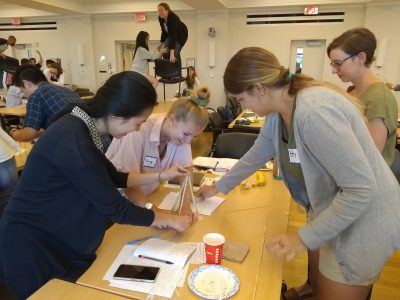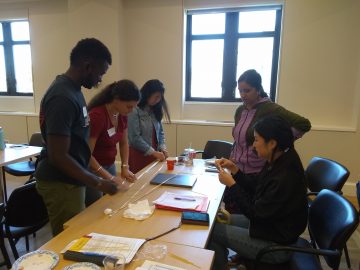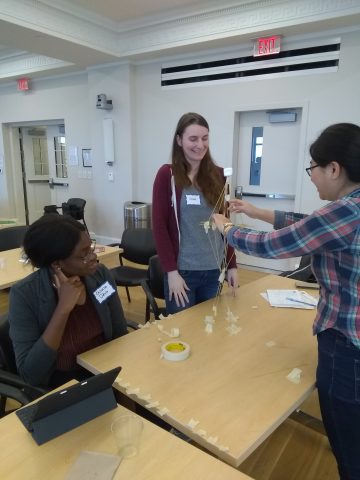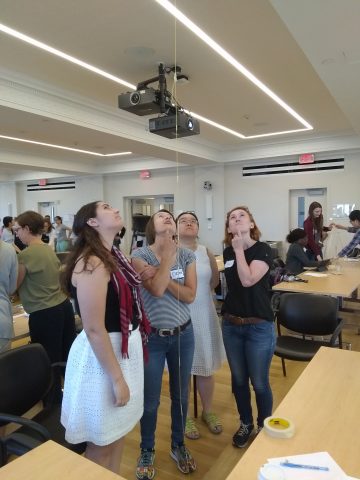Finding Success Through Failure

By Katya Hrichak
Encountering failure is inevitable. Whether it takes the form of an unsuccessful experiment or a job rejection, everyone experiences failure. But, according to Dr. Susan Anderer ’97, no one can be completely successful without it.
“Failure is an interesting word, if you think about it. It has some negative connotations to it, but you actually can’t get anywhere without it,” she said. Her talk, “Failure: The Essential Ingredient for Success,” was part of the leadership retreat presented by the Graduate and Professional Women’s Network (GPWomeN) and President’s Council of Cornell Women (PCCW).

By dissecting events that could be perceived as failures in both her life and that of Ruth Bader Ginsburg ‘54, Anderer gave attendees perspectives to consider when reflecting upon their own failures.
“My theme for today began with a failure. When I came to Cornell in 1983 as a freshman, I came here to be a veterinarian. That is not exactly how it worked out,” she said, sharing the events that led her to psychology. “What seems like a failure actually led me into an area that I am passionate about, and if I had not had that failure experience, I would not be here talking with you today.”
Through various examples and group activities, her message to students was not to dwell on failure, but to learn from it. In the face of failure, she urged students to reflect on the experience, asking themselves: What can I learn from this? What could I have done differently? Do I need to acquire or improve my skills? Who can I learn from? What will I do next?
 Anderer stressed the importance of resilience and being able to bounce back from failure. To do this, she advised students to focus on the process rather than the outcome by breaking down large goals into smaller goals, reframing goals, and visualizing obstacles.
Anderer stressed the importance of resilience and being able to bounce back from failure. To do this, she advised students to focus on the process rather than the outcome by breaking down large goals into smaller goals, reframing goals, and visualizing obstacles.
Another important step to recovering from failure, she said, is to interrupt negative thoughts and be mindful of one’s self-talk. If these steps prove difficult, Anderer reminded students that seeking a coach, mentor, or therapist is always an option.
“All of us are going to encounter roadblocks at some point. It’s the ability to recover from those setbacks that either allows that fear of failure to paralyze you or helps you to use that as a tool to learn and grow from,” she said.
Assistant Dean for Graduate Student Life Janna Lamey reiterated the importance of accepting failure as part of the creative process, learning to be resilient, and not allowing failure to amount to a negative perception of self.
 “We hear from students all the time about stressors associated with the image of being perfect. This can translate to anything less than perfect equating to not only failing, but being a failure. And, we know that failure can be a critical piece if we want to encourage creativity, risk-taking, and growth,” she said. “Dr. Anderer was fantastic as she started a conversation among our graduate students about failure being a part of life and how we can increase our skills to be able to have a healthy mindset about the impact failure has on our own worth.”
“We hear from students all the time about stressors associated with the image of being perfect. This can translate to anything less than perfect equating to not only failing, but being a failure. And, we know that failure can be a critical piece if we want to encourage creativity, risk-taking, and growth,” she said. “Dr. Anderer was fantastic as she started a conversation among our graduate students about failure being a part of life and how we can increase our skills to be able to have a healthy mindset about the impact failure has on our own worth.”
This talk was the final event in the 2018-19 GPWomeN-PCCW Speaker Series. Funded by a President’s Council of Cornell Women (PCCW) Leadership Grant, the GPWomeN-PCCW Speaker Series will continue in Fall 2019.
Katya Hrichak is a communications assistant in the Graduate School.

